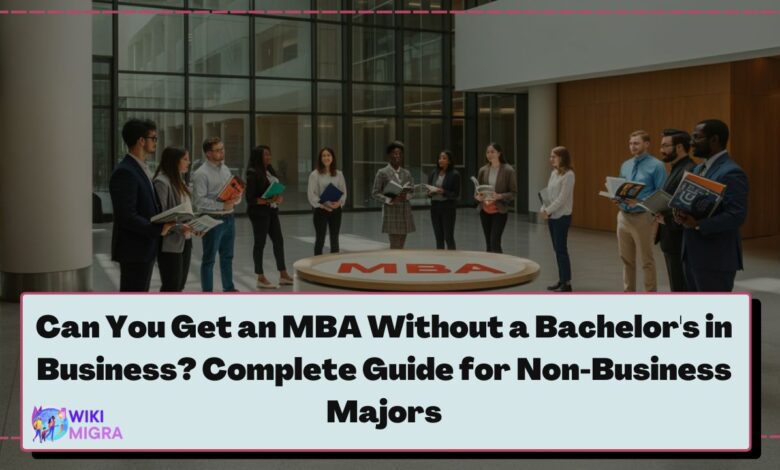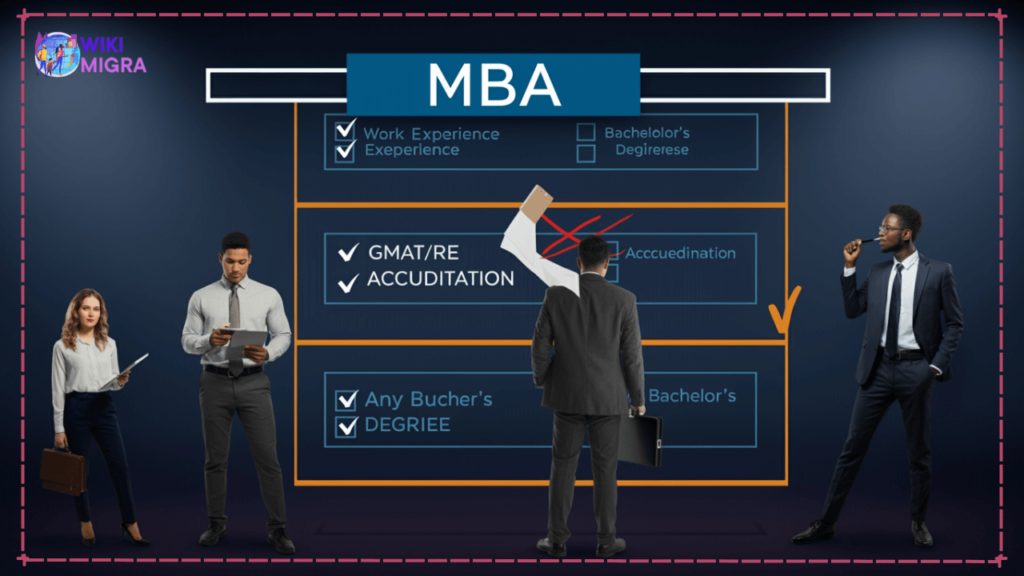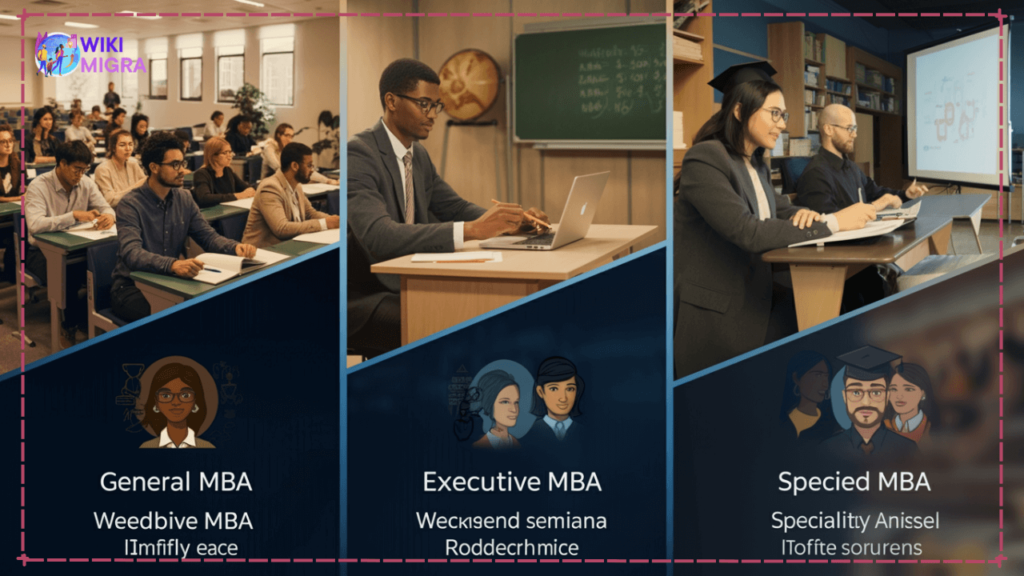Can You Get an MBA Without a Bachelor’s in Business? Complete Guide for Non-Business Majors

Yes, you can get an MBA without a bachelor’s in business! In fact, many top business schools actively seek candidates with diverse academic backgrounds. While pursuing an MBA without a business undergraduate degree presents unique challenges, it also offers distinctive advantages that can make you stand out in both the application process and your future career.
An MBA (Master of Business Administration) remains one of the most sought-after graduate degrees globally, opening doors to leadership positions, career advancement, and significant salary increases. What many prospective students don’t realize is that business schools value diversity of thought and experience—including academic diversity.
This comprehensive guide will walk you through everything you need to know about pursuing an MBA without a business background, from understanding admission requirements to crafting a compelling application and choosing the right program for your career goals.
Understanding the MBA Landscape

What Is an MBA?
An MBA is a graduate-level degree designed to develop the skills needed for careers in business and management. The curriculum typically covers areas such as accounting, finance, marketing, organizational behavior, operations management, and strategy. Beyond technical knowledge, MBA programs emphasize leadership development, critical thinking, and problem-solving abilities.
Who Is the Typical MBA Candidate?
Contrary to popular belief, the “typical” MBA candidate doesn’t necessarily have an undergraduate business degree. A survey of top business schools reveals that approximately 40-60% of MBA students come from non-business backgrounds, including engineering, humanities, sciences, and the arts.
Take Harvard Business School, for example, where recent class profiles show students from over 50 different undergraduate majors. Stanford GSB similarly boasts a diverse academic mix, with humanities and social sciences well-represented alongside business and STEM degrees.
Why MBA Programs Value Diverse Backgrounds
Business schools increasingly recognize the value that different perspectives bring to the classroom:
- Diverse thinking approaches: Engineers bring analytical mindsets, humanities majors contribute communication skills, and science graduates offer research methodology expertise.
- Real-world problem-solving: Complex business challenges require multidisciplinary approaches.
- Innovation potential: Some of the most groundbreaking business ideas emerge when different knowledge domains intersect.
- Classroom dynamics: Discussions are richer when participants view cases through different lenses.
Professor Linda Hill of Harvard Business School notes that “innovation often happens at the intersection of diverse perspectives,” which explains why business schools actively recruit from varied academic disciplines.
The “Yes, But…” Factors: Essential Requirements and Prerequisites

While you can absolutely pursue an MBA without a business bachelor’s, there are important requirements to consider:
Accreditation Matters
Always prioritize programs accredited by recognized bodies like AACSB, EQUIS, or AMBA. Accreditation ensures quality education and significantly impacts how employers view your degree.
Non-business majors should pay particular attention to accreditation, as the credential helps validate your business education to employers who might question your lack of undergraduate business training.
Work Experience
Most competitive MBA programs require significant work experience:
- Typical requirement: 3-5 years of professional experience (though some programs accept candidates with less)
- Quality over quantity: Leadership roles, project management, and demonstrable impact matter more than years served
- How non-business majors can stand out: Highlight experiences that demonstrate business acumen, such as managing budgets, improving processes, or leading teams
For example, an English major who managed editorial teams or a chemist who led laboratory projects can frame these experiences in business-relevant terms.
GMAT/GRE Scores
Standardized tests remain important for MBA admissions, especially for non-business applicants:
- Average scores: Top programs typically look for GMAT scores above 700
- Sectional balance: Strong quantitative scores can help offset concerns about non-business backgrounds
- Test preparation resources: Manhattan Prep, Kaplan, and the Official GMAT/GRE guides offer targeted preparation
Some programs now offer test waivers for candidates with strong professional accomplishments or previous quantitative academic success, so research your target schools’ policies.
GPA Considerations
Admissions committees evaluate your undergraduate GPA as an indicator of academic ability:
- Typical minimum: 3.0, with competitive programs looking for 3.5+
- Explaining lower GPAs: Address less-than-stellar grades in your application, focusing on subsequent academic success or professional achievements
- Quantitative coursework: Strong grades in math, statistics, or economics courses can reassure admissions committees about your ability to handle MBA quantitative requirements
You may be interested in: Explore Online Business Degree Programs Accredited
MBA Programs That Welcome Non-Business Backgrounds

General MBA Programs
Many traditional two-year MBA programs are designed for diverse academic backgrounds:
- Core curriculum: Extensive foundational courses ensure all students develop essential business knowledge
- Pre-MBA workshops: Many schools offer “boot camps” covering accounting, finance, and economics basics before formal classes begin
- Support systems: Look for programs with strong academic support resources, including tutoring and study groups
Executive MBA (EMBA) Programs
EMBA programs often place greater emphasis on professional experience than undergraduate background:
- Work experience focus: Typically requires 8-10+ years of experience, prioritizing management responsibilities over academic history
- Cohort model: Learning alongside experienced professionals from diverse industries
- Weekend or modular formats: Allows continued employment while studying
Specialized MBA Programs
Consider MBA programs tailored to your undergraduate field or career goals:
- Industry-specific MBAs: Programs focusing on healthcare, technology, or creative industries often value related non-business degrees
- Functional specializations: Marketing MBAs value communications backgrounds, while operations MBAs appreciate engineering degrees
- Dual-degree options: Some schools offer combined MBA/MD, MBA/JD, or MBA/Engineering programs for career-changers
Building Your MBA-Ready Profile
Showcase Relevant Skills
Highlight and develop these key abilities valued in MBA programs:
Analytical Skills
- Take online courses in statistics, data analysis, or financial modeling
- Volunteer to analyze data in your current role
- Complete analytical projects that demonstrate quantitative abilities
Communication Skills
- Join Toastmasters or similar public speaking groups
- Take leadership in presentation opportunities at work
- Develop writing skills through professional communications
Leadership Skills
- Seek management responsibilities in your current role
- Lead volunteer or community initiatives
- Mentor junior colleagues or team members
Problem-Solving Skills
- Document cases where you’ve identified and resolved complex challenges
- Participate in hackathons or innovation competitions
- Develop process improvements in your organization
Addressing Knowledge Gaps
Bridge Programs/Prerequisite Courses
- HBX CORe: Harvard Business School’s online credential covering business analytics, economics, and financial accounting
- MBA Math: Online program covering key quantitative skills
- Community college courses: Affordable options for accounting, economics, and statistics fundamentals
Online Courses
- Coursera: Offers business fundamentals from top universities, including Wharton and Yale
- edX: Features business courses from institutions like MIT and Berkeley
- Udemy: Provides practical business skills training on platforms like Excel and SQL
Self-Study Resources
- Books: “The Ten-Day MBA” by Steven Silbiger; “Financial Intelligence” by Karen Berman and Joe Knight
- Podcasts: HBR IdeaCast, Masters of Scale, Planet Money
- Websites: Investopedia, Khan Academy’s economics and finance sections
Networking
Building connections in the business world is particularly important for non-business majors:
- Alumni networks: Connect with graduates from your target schools
- Professional associations: Join industry groups related to your career goals
- MBA fairs and information sessions: Attend events to meet admissions representatives
- Informational interviews: Speak with current students and recent graduates about their experiences
Crafting a Compelling Application
The Personal Statement/Essay
For non-business applicants, the essay is crucial for explaining your path to an MBA:
- Connect the dots: Clearly articulate how your non-business background led to your interest in business education
- Highlight unique perspective: Explain how your diverse background will contribute to the MBA community
- Address the “why now” question: Clearly explain your timing and motivation
- Be authentic: Avoid trying to sound like a “typical” business candidate
Letters of Recommendation
Strategic selection of recommenders can strengthen your application:
- Choose recommenders who understand business relevance: Supervisors who can speak to your leadership, analytical abilities, and potential
- Brief recommenders thoroughly: Explain your MBA goals and provide context about how their letter can address potential concerns about your non-business background
- Diverse perspectives: Consider including one recommendation from someone with an MBA who can address your readiness
Highlighting Transferable Skills
Frame your non-business experience in business-relevant terms:
- Scientists: Emphasize research methodology, data analysis, and experimental design
- Engineers: Highlight project management, process improvement, and technical problem-solving
- Humanities graduates: Showcase communication skills, critical thinking, and cultural awareness
- Healthcare professionals: Focus on operational efficiency, stakeholder management, and ethical decision-making
Real-World Examples and Success Stories
From Anthropology to Consulting Leadership
Sarah Thompson earned her undergraduate degree in Anthropology before working for a non-profit organization. After completing her MBA at Northwestern’s Kellogg School of Management, she joined McKinsey & Company, where she now leads their cultural transformation practice. Her anthropological training gives her unique insights into organizational behavior that her business-major colleagues often miss.
“My anthropology background taught me to observe human systems holistically,” Thompson explains. “In business consulting, this translates to seeing patterns and connections others might overlook.”
Engineering to Investment Banking
Michael Chen, an electrical engineering graduate, worked for five years developing semiconductor technology before pursuing his MBA at Wharton. He now works in investment banking, specializing in technology sector M&A.
“Engineering taught me systematic problem-solving and attention to detail,” Chen says. “These skills proved invaluable in financial modeling and deal analysis. The MBA gave me the business language and frameworks I needed to translate my technical knowledge into financial value.”
English Literature to Marketing Executive
Emma Rodriguez majored in English Literature before spending three years in publishing. After earning her MBA from UCLA Anderson, she joined a major consumer products company and has risen to Marketing Director.
“My literature background gave me deep insights into narrative and human motivation,” Rodriguez shares. “The MBA equipped me with the analytical tools to measure the effectiveness of those narratives in driving consumer behavior.”
The ROI of an MBA for Non-Business Majors
Career Trajectory Impact
Data consistently shows strong returns on MBA investment, regardless of undergraduate major:
- Salary increases: The Graduate Management Admission Council reports that MBA graduates typically see 77% increases in total compensation compared to pre-MBA salaries
- Career switching success: Over 80% of MBA graduates successfully change either industry, function, or both
- Advancement timeline: MBA graduates often reach senior management positions 5-7 years faster than non-MBA counterparts
Industry-Specific Advantages of Diverse Backgrounds
Non-business majors with MBAs often find particular success in these areas:
- Healthcare management: Biology or nursing undergrads with MBAs
- Technology product management: Computer science majors with MBAs
- Arts administration: Fine arts graduates with MBAs
- Pharmaceutical marketing: Chemistry majors with MBAs
- Sustainable business initiatives: Environmental science graduates with MBAs
Choosing the Right MBA Program for Non-Business Majors
Key Selection Factors
Consider these elements when evaluating programs:
- Strong core curriculum: Look for programs with comprehensive foundational coursework
- Pre-term preparation: Programs offering “boot camps” or prep courses
- Support for career switchers: Strong career services specifically for those changing industries
- Alumni outcomes for non-business majors: Ask schools for data on graduates with backgrounds similar to yours
Program Format Considerations
- Full-time programs: Ideal for significant career changes
- Part-time options: Allow continued income while studying
- Online programs: Offer flexibility but may provide fewer networking opportunities
- Executive MBAs: Appropriate for those with substantial work experience
Financial Considerations
- Scholarship opportunities: Some schools offer specific scholarships for candidates with unique backgrounds
- Employer sponsorship: Particularly relevant for part-time and executive programs
- Return on investment timeline: Consider how quickly you’ll recoup costs based on industry and role targets
Conclusion
Getting an MBA without a bachelor’s in business is not only possible—it can be advantageous. The diverse perspective you bring to business education can make you stand out both in the application process and in your post-MBA career.
By strategically addressing potential knowledge gaps, highlighting transferable skills, and choosing the right program for your background and goals, you can successfully navigate the path to business school and beyond. Many of today’s most innovative business leaders came from non-traditional backgrounds, bringing fresh thinking to complex challenges.
Remember that business schools value diversity of thought and experience. Your non-business background isn’t a limitation—it’s a distinctive asset that can set you apart in an increasingly competitive business world.
Ready to start your MBA journey? Begin by assessing your profile, identifying knowledge gaps, and researching programs that value your unique background. The business world needs diverse perspectives, and your non-traditional path may be exactly what sets you apart.
FAQs
How to Get into an MBA Program Without a Business Degree
You don’t need a business degree to get into an MBA program. Many schools welcome students from all kinds of academic and professional backgrounds. Here’s how you can prepare and strengthen your application step by step:
1. Understand What MBA Programs Require
Most MBA programs only require:
- A bachelor’s degree in any subject.
- GMAT or GRE test scores (sometimes optional).
- Work experience (usually 2-5 years is preferred).
- Recommendation letters.
- A strong personal statement or essay.
Having a business degree is not necessary, but meeting these general requirements is important.
2. Showcase Your Transferable Skills
Even if you don’t have a business background, you likely have skills that are valuable for an MBA program. Highlight things like:
- Leadership experience.
- Problem-solving abilities.
- Teamwork and collaboration.
- Communication skills.
These can come from your job, volunteer work, or other experiences.
3. Learn Basic Business Concepts
If you’ve never studied business topics like accounting, finance, or economics, consider taking some introductory courses before applying. You can find these online or through community colleges. Some MBA programs even offer pre-MBA prep courses to help you catch up.
4. Do Well on the GMAT or GRE
Strong test scores can show that you’re ready for the academic challenges of an MBA program, especially if your background isn’t in business. If the school doesn’t require these tests (some waive them), focus on other parts of your application instead.
5. Highlight Your Work Experience
MBA programs value real-world experience more than your specific academic background. Talk about:
- Projects where you took initiative.
- Times when you led a team or solved problems at work.
- Any achievements that show your potential as a leader.
Even non-business jobs can provide great examples of leadership and growth.
6. Write a Strong Personal Statement
Your essay is your chance to explain why you want an MBA and how it fits with your career goals. Use this opportunity to:
- Show how your unique background will add value to the program.
- Explain what motivates you to pursue an MBA now. Be clear about what you hope to achieve after graduation.
7. Get Great Recommendation Letters
Ask people who know your work well—like supervisors or mentors—to write recommendation letters for you. They should talk about:
- Your strengths and accomplishments.
- Why they believe you’ll succeed in an MBA program.
Choose recommenders who can give detailed examples of your abilities rather than just generic praise.
8. Look for Programs That Welcome Non-Business Students
Some MBA programs specifically value diversity in their student body and actively recruit people from non-business fields like engineering, healthcare, arts, education, etc. Research schools that emphasize this kind of diversity in their admissions process.
9. Consider Flexible Options Like Online MBAs
If you’re worried about balancing work and studies, look into part-time or online MBA programs designed for working professionals. These programs often cater to people transitioning from different fields into business careers.
10. Network with Alumni and Current Students
Talk to people who are already part of the program you’re interested in:
- Reach out to alumni or current students through LinkedIn or school events.
- Ask them about their experiences applying without a business degree. This will help you understand what the school values in applicants like yourself.
Can I get an MBA without taking the GMAT/GRE?
Some programs offer GMAT/GRE waivers based on factors like work experience, previous advanced degrees, or strong undergraduate quantitative coursework. Research your target schools’ policies, as requirements vary significantly.
How I broke into Consulting without a Business Degree (VIDEO)
References:
- AACSB Accredited Programs
- GMAT Waiver List
- U.S. Bureau of Labor Statistics (Salary Data)
- www.coursera.org





